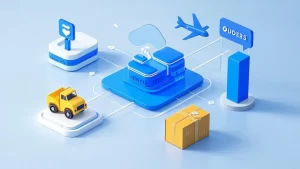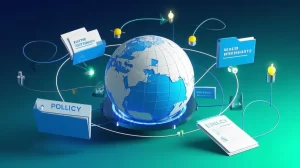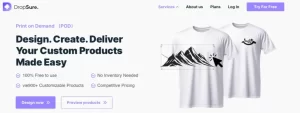
When TikTok “went dark” in the U.S., e-commerce businesses had to rethink how this would impact their operations. The TikTok ban isn’t just about data privacy; it’s also a glimpse into the bigger shifts happening in international trade and the digital economy. For dropshippers operating in global markets, it’s a mix of challenges and opportunities.
In this blog, we’ll talk about what happened, how it affects cross-border e-commerce, and share some practical tips to help you sellers navigate these changes.
Here’s what happen to TikTok.Back in 2023, the U.S. government rolled out some strict new rules against TikTok. The government said the app was a threat to national security. The controversy wasn’t just about the app itself, but also about its parent company, ByteDance, since it shares U.S. user data with the Chinese government. TikTok insisted that its data is stored in the U.S. and managed by third-party firms, but that didn’t lower U.S. government’s concerns.This dispute was about more than just one company—it became a really important clash between the tech industry and international policy.

For dropshippers, this is a good example of how global events can influence your business. If you rely on TikTok ads to bring customers to your store, once TikTok is banned, your main way of getting traffic would gone. So it’s important to use more than one platform, like Instagram or Facebook, for marketing. What’s more, you need to obey data rules in the countries of your target customers are. For example, if you’re meking deal with U.S. buyers, make sure your tools and platforms follow U.S. privacy laws. This way, you can avoid surprises and keep your business running smoothly.
The TikTok Ban and Its Lessons for E-Commerce
For e-commerce entrepreneurs, especially those selling on dropshipping, the event showed how important it is to adapt, think ahead, and make a plan for how to deal with a global landscape that is becoming more and more regulated. In the following part, we’ll share some practical tips that will help e-commerce businesses revive and thrive in an ever-changing world.
Market Diversification is Essential
t might feel simple to depend on one market, but it can put your business at risk if unexpected rules or changes happen. For example, a sudden tariff hike, import ban, or new law in one area could make it harder to serve customers or stay profitable. That’s why it’s important to not put all your eggs in one basket and explore other markets.
Here’s a quick tip: don’t rely on just one market. By spreading out, you can avoid big issues if one market faces trouble. Start by focusing on places with stable rules and strong demand for your products. Tools like Shopify or WooCommerce make it super easy to set up online stores in multiple countries and reach new customers. This way, you can reduce risks and unlock exciting growth opportunities worldwide!
Make the most of cross-border partnerships
We get itcross-border e-commerce can feel a bit overwhelming. But don’t worry, we’re here to guide you! By partnering with reliable logistics providers, payment processors, and local distributors, you can tackle those challenges head-on. These partnerships bring local know-how, making it easier to follow regional rules, clear customs smoothly, and get orders delivered faster. For example, a good logistics company can help you avoid shipping delays and cut down on costs. And with a trustworthy payment processor, handling multiple currencies becomes super simple.

These collaborations also help your business run more smoothly and give your customers a better experience. For example, a local distributor in Japan might tell you that customers there value minimalistic packaging, which can help you tailor your product presentation. Or a distributor in Europe might highlight the growing demand for eco-friendly products, giving you a chance to adapt your offerings. By teaming up with the right partners, you can build an efficient, scalable system that not only supports growth but also helps you succeed in connecting with customers across international markets.
Invest in Technology and Customer Experience
Technology is a real game-changer for e-commerce businesses. It makes everything smoother and stronger. For instance, AI-driven tools can predict which products will sell best next season, so you can stock up on what customers actually want. Imagine having a system that automatically updates inventory levels or flags low stock—no more overselling or running out at the wrong time! Automation tools, like chatbots for customer service or software that processes orders in seconds, save you hours and reduce mistakes, giving you more time to grow your business.

And let’s not forget the customer experience—it’s just as crucial. For example, sending real-time updates like “Your package is out for delivery!” or offering hassle-free returns can help you build trust and loyalty. A customer easily returns a product and gets quick support, then he is much more likely to shop with you again.
By combining smart communication with cutting-edge tech, you can create a shopping experience. It not only keeps customers happy but also makes your brand stand out in a competitive market.


 11 min read
11 min read

















